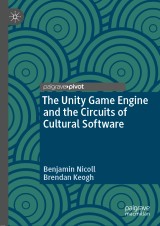Details

The Unity Game Engine and the Circuits of Cultural Software
|
58,84 € |
|
| Verlag: | Palgrave Pivot |
| Format: | |
| Veröffentl.: | 22.08.2019 |
| ISBN/EAN: | 9783030250126 |
| Sprache: | englisch |
Dieses eBook enthält ein Wasserzeichen.
Beschreibungen
<p>Videogames were once made with a vast range of tools and technologies, but in recent years a small number of commercially available 'game engines' have reached an unprecedented level of dominance in the global videogame industry. In particular, the Unity game engine has penetrated all scales of videogame development, from the large studio to the hobbyist bedroom, such that over half of all new videogames are reportedly being made with Unity. This book provides an urgently needed critical analysis of Unity as ‘cultural software’ that facilitates particular production workflows, design methodologies, and software literacies. Building on long-standing methods in media and cultural studies, and drawing on interviews with a range of videogame developers, Benjamin Nicoll and Brendan Keogh argue that Unity deploys a discourse of democratization to draw users into its ‘circuits of cultural software’. For scholars of media production, software culture, and platform studies, this book provides a framework and language to better articulate the increasingly dominant role of software tools in cultural production. For videogame developers, educators, and students, it provides critical and historical grounding for a tool that is widely used yet rarely analysed from a cultural angle.</p><br><p></p>
<p></p><p>Chapter one: The Unity game engine and the circuits of cultural software.-Chapter two: Unity's socio-historical context and political economy.-Chapter three: Workflow: Unity's coordination of individualized labour process.-Chapter four: Grain: Default settings, design principles, and the aura of videogame production.-Chapter five: Literacy: Articulations of Unity across development, education, and enthusiast contexts.-Chapter six: Governance: Unity's democratization dispositif.</p><p></p>
<p></p><p><b>Benjamin Nicoll</b> is Lecturer in Digital Media and Communication and a member of the Digital Media Research Centre at Queensland University of Technology, Australia. His research focuses on the history and critical theory of videogames and videogame platforms. He is the author of <i>Minor Platforms in Videogame History </i>(2019).</p>
<p><b>Brendan Keogh</b> is an Australian Research Council Fellow in the Digital Media Research Centre at Queensland University of Technology, Australia. His research focuses on the experiences, skills, and innovations of videogame makers, as well as broader investigations into videogame culture. He is the author of <i>A Play of Bodies: How We Perceive Videogames</i> (2018) and <i>Killing is Harmless: A Critical Reading of Spec Ops The Line</i> (2012).</p><br><p></p>
<p><b>Brendan Keogh</b> is an Australian Research Council Fellow in the Digital Media Research Centre at Queensland University of Technology, Australia. His research focuses on the experiences, skills, and innovations of videogame makers, as well as broader investigations into videogame culture. He is the author of <i>A Play of Bodies: How We Perceive Videogames</i> (2018) and <i>Killing is Harmless: A Critical Reading of Spec Ops The Line</i> (2012).</p><br><p></p>
Videogames were once made with a vast range of tools and technologies, but in recent years a small number of commercially available 'game engines' have reached an unprecedented level of dominance in the global videogame industry. In particular, the Unity game engine has penetrated all scales of videogame development, from the large studio to the hobbyist bedroom, such that over half of all new videogames are reportedly being made with Unity. This book provides an urgently needed critical analysis of Unity as ‘cultural software’ that facilitates particular production workflows, design methodologies, and software literacies. Building on long-standing methods in media and cultural studies, and drawing on interviews with a range of videogame developers, Benjamin Nicoll and Brendan Keogh argue that Unity deploys a discourse of democratization to draw users into its ‘circuits of cultural software’. For scholars of media production, software culture, and platform studies, this book provides a framework and language to better articulate the increasingly dominant role of software tools in cultural production. For videogame developers, educators, and students, it provides critical and historical grounding for a tool that is widely used yet rarely analysed from a cultural angle.<p></p>
“The game industry is notoriously opaque, even for insiders. This book lifts the veil of secrecy and demystifies how game engines are used, understood, marketed, and governed. True to form, Nicoll and Keogh provide an empirically grounded and highly readable account of game engines as ‘cultural software’. Scholars, students, and practitioners are sure to benefit from the savvy analysis of such a vital, yet seemingly invisible piece of software that powers a billion-dollar industry.” (Dr. David B. Nieborg, University of Toronto, Canada)<p>“This original, timely, and accessible case study carefully unpacks the ambivalence of Unity’s claim to ‘democratize’ game development. Based on extensive research, Nicoll and Keogh propose a new conceptual framework to guide analysis of the cultural work of platform-based digital content production. This is a stellar example of how to advance critical media research on the materiality and politics of platforms.” (Greig de Peuter, co-author of Games ofEmpire and Digital Play)</p><p></p>

















